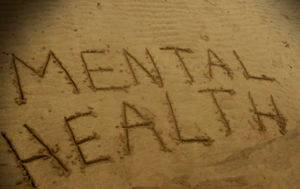News
Obindo now challenges Buhari to sign the Mental Health Bill.

For nearly two decades, mental health regulatory reforms have languished in Nigeria’s legislative chambers, with failed attempts at overhaul in 2003 and 2013. The Senate passed the mental health legislation for the second time in 2019, with public hearings scheduled for 2020.
While the Bill’s harmonisation between both legislative branches was completed in 2021, mental health practitioners and advocates have been anxiously awaiting its finalization and assent by President Mohammadu Buhari.
According to a memorandum from the Clerk of the National Assembly, the National Assembly passed the National Mental Health Bill, 2021, on November 28th, 2022, and forwarded it to President Buhari for consideration and assent last week.
The views of Prof. Taiwo Obindo, President of the Association of Psychiatrists in Nigeria, were sought by Good Health Weekly – a body of psychiatrists in Nigeria that has been at the forefront of ensuring that the Bill is passed and signed into law.
In this interview with Chioma Obinna, Obindo believes the legislation is a game changer because Nigeria has never passed such a law since its independence. Excerpts:
“We thank the National Assembly for advancing this Bill to the President and appreciate the many legislators who helped make it happen, including the Chairs of the House Healthcare Services Committee and Senate Health Committee, Rep. Dr. Sununu and Senator Dr. Ibrahim Oloreigbe.”
Representatives Henry Nwawuba, Francis Waive, and Uchechukwu Nnam-Obi, among others, have all played important roles. We hope they and their colleagues will continue to advocate for mental health and Executive assent.”
The proposed legislation will help to replace the 1958 Lunacy Act, which practitioners regard as outdated and inhumane. The National Mental Health Bill includes provisions such as the establishment of a Department of Mental Health Services within the Federal Ministry of Health and the establishment of a Mental Health Fund.
It will also contribute to the establishment of human rights protections for those suffering from mental illnesses, such as prohibiting discrimination in housing, employment, medical, and other social services. Improving care by ensuring that those receiving treatments have the right to participate in the development of their medical plans, as well as eliminating forced treatment, seclusion, and other forms of restraint in facilities, and expanding community-based coverage.
Under the umbrella of Nigerian Mental Health, a network of mental health stakeholders, thought leaders, and organizations, all CSOs and associations working in mental health have come together to promote the passage of the Bill and help advance the country’s mental health field.
It has coordinated an Open Letter to government leaders that over 30 mental health-focused organizations, including all four professional bodies in the field – the Association of Psychiatrists in Nigeria, the National Association of Clinical Psychologists, the Association of Medical Social Workers of Nigeria, and the Association of Psychiatric Nurses of Nigeria – have signed.
What the Bill intends to accomplish
The Mental Health Bill addresses how mentally ill people should be cared for without stigma or discrimination.
The Bill is based on global best practices in enshrining the human rights of the mentally ill, determining how care can be obtained, and prohibiting chaining or other forms of coercion. The Bill also describes how to find their care and, in general, compares mental health practice in other countries, including Ghana.
Additional advantages
Among other things, the Bill will make it easier for the mentally ill to access care and ensure that their human rights are upheld. It also aids in the regulation of the activities of mental health practitioners and the abolition of stigma and discrimination.
It will also help to address the issue of mental health care funding in Nigeria. We are pleased that it has been transmitted to the Presidency for assent following the National Assembly’s due diligence. The Presidency must act within 90 days.
Beyond sounding like a broken record, mental health is neglected, and the state of affairs is abysmally poor, with access to care being limited due to stigma and discrimination, with people relying on the formal sector for care.
Mental health disparities
In Nigeria today, less than 10% of those in need of care receive it, with more than 90% failing to do so. The practitioner-to-patient ratio in mental health is extremely low. For example, we have one psychiatrist for every one million (1:1 million) Nigerians at risk, whereas the WHO recommendation is one psychiatrist for every 1000 people. With the brain drain, the situation is actually worsening, and funding is mostly coming from one’s own pocket.
Expectations
If signed into law, the Bill will ensure good mental health system governance, better practitioner services, adequate care for those with mental health conditions, human rights of the mentally ill, the elimination or significant reduction of stigma and discrimination, and adequate funding.
Rapid approval is desired.
The Bill has been long overdue. For far too long, Nigeria has operated in this sector without legislation. Except for the regional (Lagos) law known as the Lunacy Act of 1958, no law has been passed since independence.
President Buhari has 90 days to assent to it, with the clock starting on November 28th, 2022, when it was transmitted to the Presidency. This effort has lasted more than two decades. It began in 1999 with the late Senator Dr Martins Yellow, and all efforts have failed. We cannot afford to lag behind in the Committee of Nations. Ghana has had one for many years.
What happens if Buhari does not consent within 90 days?
The Bill will be reintroduced in the House of Assembly. As a parting gift to Nigeria and Nigerians, the President should leave a modern, globally acceptable, humane, and decent law governing mental health practice.
A law that improves access and funding, reduces stigma and discrimination, regulates the practice, prohibits unwholesome practices such as chaining and beating, and respects the human rights of those living with mental illness. It is their right to have access to healthcare and to live in order to achieve their life goals.
It is unlikely that he will refuse to sign the bill, which is long overdue and desperately needed.
If it is not agreed upon, it will undoubtedly be a huge disappointment to all mental health practitioners, stakeholders, and the world at large. The world expects more from Africa’s colossus. If not, we’ll go back to the drawing board and start over.
APN participation
Following ratification, we will work with the Ministry of Health, mental health practitioners, and other stakeholders to implement and enforce best practices. We will continue to raise awareness and advocate for the President to sign the bill before it becomes law.
-

 Sports7 days ago
Sports7 days agoFinidi agrees deal with NFF, names three foreign assistants
-

 Politics7 days ago
Politics7 days agoAtiku Says Tinubu’s Son Is A Director In Company Related To Coastal Road Contract
-

 Entertainment7 days ago
Entertainment7 days ago“I Met My Husband Online And I’m Happily Married To Him As The 3rd Wife”– Bimpe Akintunde Says As She Shed More Light On Her Marriage
-

 Sports7 days ago
Sports7 days agoRaphael Onyedika Suspended For Club Brugge’s Conference League Clash With Fiorentina
-

 News7 days ago
News7 days agoIkpeazu Protests Planned Probe of Abia’s N10bn Airport Project
-

 Sports7 days ago
Sports7 days agoIs it time for Maduka Okoye to displace Stanley Nwabali as Super Eagles’ number one?
-

 News2 days ago
News2 days agoFamily, Friends Celebrate Jailed Former Deputy Senate President, Ike Ekweremadu’s Birthday
-

 Gist7 days ago
Gist7 days ago“I used to toast Mercy Aigbe back in UNILAG and she really liked me, I even had a picture of us together”- Comedian Teju Babyface spill




